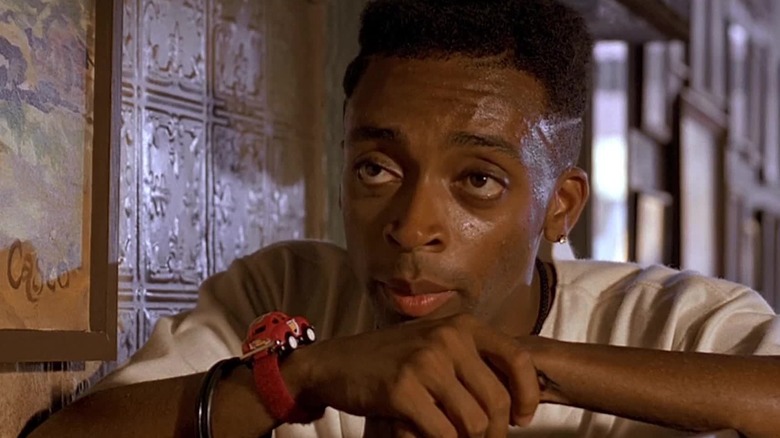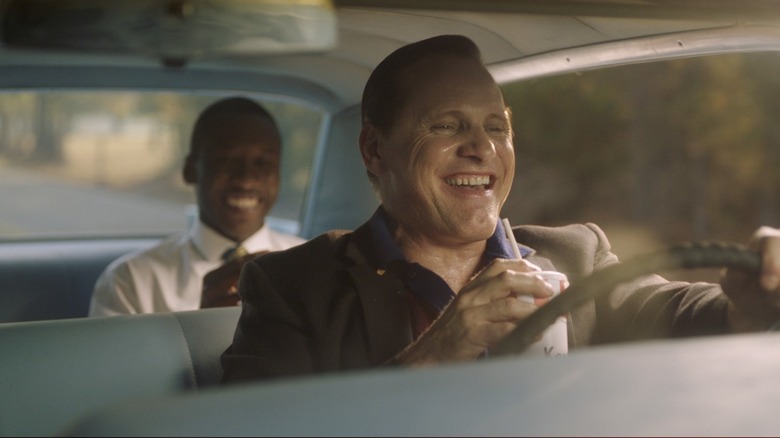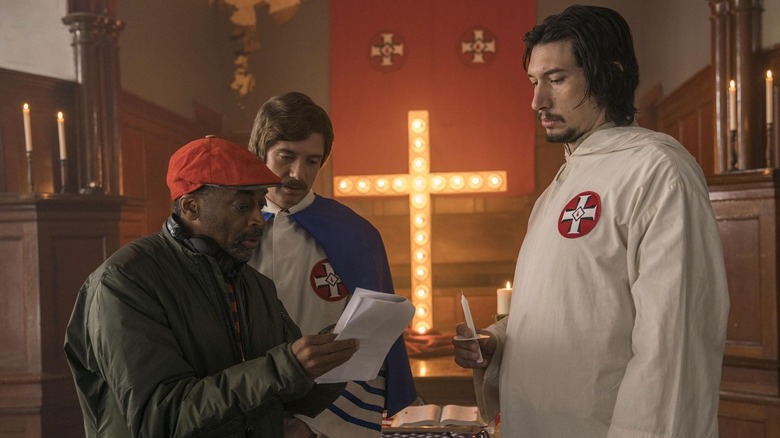The Oscars Win That Made Spike Lee Storm Off In Disgust
The Academy of Motion Picture Arts and Sciences has a lousy track record when it comes to getting its awards to the most deserving nominees. There are myriad examples of injustices, and, when it comes to Best Picture, a history of settling on a movie that most people at least really like, even if few outright love it. In recent years, we've had the perfectly fine "Spotlight," "Argo," Nomadland," and "CODA" take home the top prize. They weren't the best movies of their respective years, not even close, but they were proficiently directed movies buoyed by excellent performances and accomplished (if somewhat formulaic) screenplays.
The Academy has had a decent five year Best Picture run (most likely due to its ongoing diversity initiative, which has broadened the membership ranks beyond its bevy of white men), but in 2018 there was a galling regression to the bad ol' days when white Hollywood phonies made bogus can't-we-all-just-can't-get-along bromides congratulating themselves for viewing people of different colors and ethnicities as actual human beings. That voters chose to do it in a year when they had a golden opportunity to right one of the most egregious wrongs in the Academy's history stood then as a reminder that the organization was still overrun with clowns who seem to believe we solved that whole racism problem 50 years prior when Spencer Tracey let Sidney Poitier marry his daughter in "Guess Who's Coming to Dinner."
Directed with missionary-position dutifulness by Peter Farrelly, "Green Book" had no business being nominated for Best Picture, let alone winning the award. Alleged historical inaccuracies and misrepresentations aside, it's the unremarkable journey of a racist schmuck who learns that he doesn't have to throw out a perfectly good glass because a Black person drank from it. It is, as Spike Lee noted after the ceremony, an unwelcome echo of the 1989 Best Picture winner "Driving Miss Daisy."
And it made perfect sense that he allegedly tried to bolt the Dolby Theatre after Julia Roberts read its title from the opened envelope — because this time, he'd given the Academy a fiery alternative to the feel-good pablum of "Green Book."
The Academy made the poor choice... again
Spike Lee attended the 1990 Academy Awards, when "Driving Miss Daisy" triumphed over what felt at the time like an underwhelming quartet of contenders. If they voted today, I think "Field of Dreams" walks away with trophy, but I could see Oliver Stone's "Born on the Fourth of July" taking it as well (especially since he won Best Director). "My Left Foot" is still a very good movie that deservedly earned Daniel Day-Lewis and Brenda Fricker, respectively, Best Actor and Best Supporting Actress, while "Dead Poets Society" feels almost as dated as "Driving Miss Daisy" 34 years later.
Lee was there to watch his absurdly superior "Do the Right Thing" lose Best Original Screenplay to Tom Schulman's "Dead Poets Society." That "Do the Right Thing" never had a shot at a Best Picture nomination because it unflinchingly depicted the wretched state of race relations in the United States came as a surprise to no one. Even though Bruce Beresford was denied a Best Director nomination, everyone tuned in that night knowing "Driving Miss Daisy" was a lock for Picture and Actress (Jessica Tandy being Hollywood royalty and all).
Many of the nation's critics, most notably Gene Siskel and Roger Ebert, loudly decried the injustice of "Do the Right Thing" not even getting nominated. But we all knew it was too strong a dose of medicine for the overwhelmingly white, politely liberal Academy to stomach. Lee was lucky just to get the Screenplay nod.
At the outset of 2018, we knew Spike Lee's "BlacKkKlansman" was coming, and when it earned mostly rave reviews at that year's Cannes Film Festival, it looked like it had a solid shot at Best Picture. But by the end of the fall festival season, it was clear the film had major competition. "A Star Is Born," "Roma" and "The Favourite" all felt like frontrunners at one point or another. Then the National Board of Review inexplicably named "Green Book" its Best Film of the year, and the tide slowly started to turn. Could the Academy buy the same lie about race relations in the U.S. after the election of Donald J. Trump and the murder of Heather Heyer in Charlottesville (footage of which is edited into the horrifying coda of "BlacKkKlansman")?
They could and they did, and Lee was rightly outraged enough to want to leave the ceremony before the winners gave their speeches.
An embarrassment of terrific options led to a horrifyingly embarrassing win
According to a tweet from AP reporter Andrew Dalton, Lee flailed his arms "in disgust" and attempted to walk out of the Dolby Theatre, but was not permitted to leave. He eventually went back to his seat and listened to the speeches.
It's worth noting that, on the day of the ceremony, Lee was considered the favorite to win the Best Adapted Screenplay Oscar (along with Charlie Wachtel, David Rabinowitz, and Kevin Willmott). When this came to pass, Lee gave an impassioned speech that, to his credit, didn't scorch the Academy for past snubs (which included losing the Best Documentary Oscar for his masterful "4 Little Girls" to "The Long Way Home" in 1999).
"BlacKkKlansman" was not going to win Best Picture, but there was hope that "Roma" would beat out "Green Book" after Alfonso Cuarón won Best Director. Alas, the Academy partied like it was 1989. While Lee shared his distaste for "Green Book" in post-ceremony interviews, he'd just won his first Oscar and wasn't in the mood to grouse all night. Perhaps this is because no one knows better than him that these awards are reflective of a deeper sickness in our society ... one that, if you take a look at today's headlines, you should know damn well we're a long way from curing.


